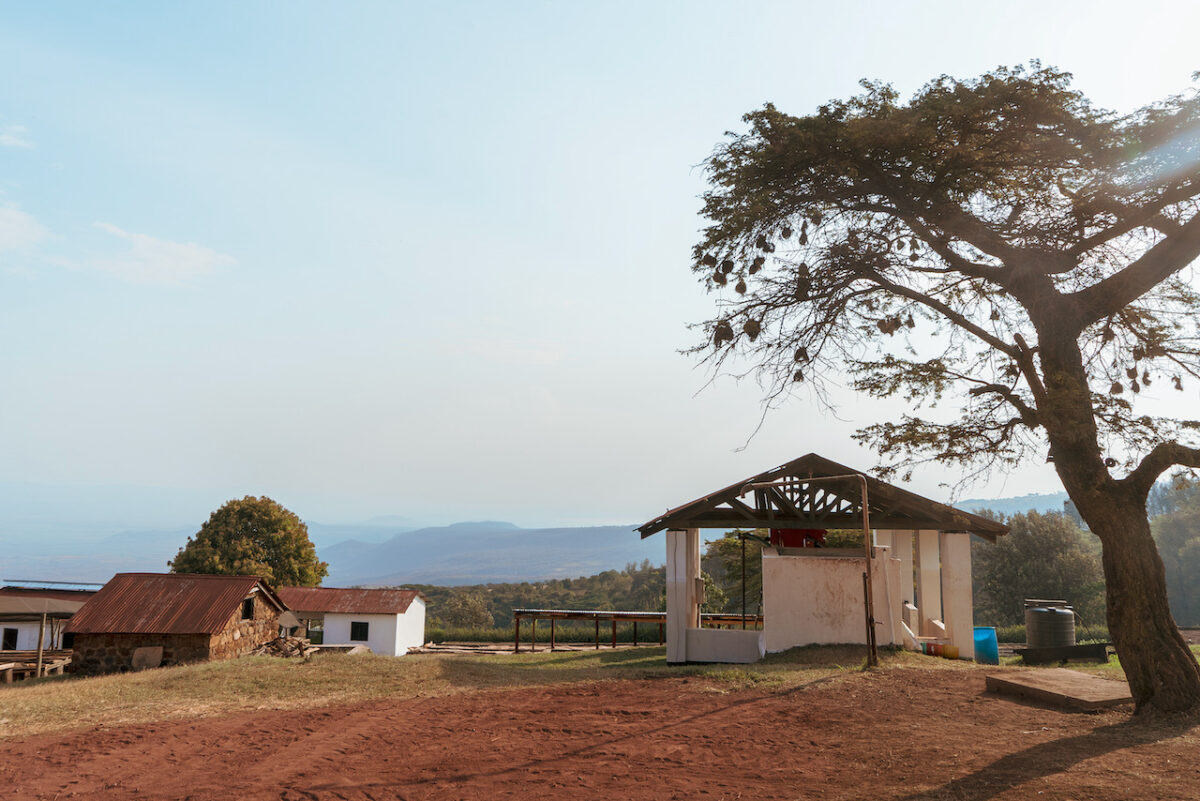Tanzania at it —
Leon’s farm, Acacia Hills, was listed as the winner of a private auction in Tanzania organized by ACE (The Alliance for Coffee Excellence).
Leon’s story embodies the history of coffee production in northern Tanzania itself, and it also vividly reflects the future of specialty coffee in Tanzania.
The history of coffee in northern Tanzania begins in the 19th century. Coffee trees were brought to northern Tanzania from Reunion Island near Madagascar and immigrants from Germany, the occupying country at the time, developed it into an industry.
“Most of the coffee plantations here in northern Tanzania seem to have been established around the 1920s after World War I. An old map we’ve come across, showed that about 80 German immigrant families moved here and established small coffee plantations.”
Leon’s grandparents were also immigrants who came to Tanzania from Greece around the early 1900s and made a living from coffee production. Leon is the third generation of the family. The family’s house is located on the outskirts of Arusha, near the Kilimanjaro International Airport. His grandfather and father mostly grew coffee in its surrounding plantations, but the land was not suitable for producing high quality coffee due to its low altitude. Leon learned about the concept of specialty coffee in the 2000s and started looking for lands in high altitude that could produce higher quality coffee.
“In the past, and still today, coffee produced in Tanzania is rarely consumed at home. Everything is exported, and most of it is commodity coffee. As the international price of coffee has dropped, it has become more difficult to make a living from coffee production. It was inevitable that we would switch to specialty coffee,” Leon said.
It was around this time that Leon met his current business partner, Mark Stell, at the 2005 EAFCA exhibition (currently known as AFCA). Mark is the founder of Portland Coffee Roasters in the US. Leon and Mark hit it off, and in 2007 they jointly purchased a coffee plantation on Mount Oldeani, which is now known as Acacia Hills. Leon was convinced that if Mark, who knew about roasting, and he, who knew about farming, could work together, they could create a synergy.
There were two reasons why they decided on Oldeani as their new farm land. The first was that the best Tanzanian coffee Mark had ever tasted was from Oldeani. The second reason was that Leon had heard a researcher say that the soil in Oldeani was ideal for growing coffee.
Leon rebuilt the rundown farm and began planting high quality coffee trees, including Kent, SL28, Geisha, and Pacamara. With his dedication and the wonderful natural environment, Acacia Hills grew in coffee quality and production.
The land around Acacia Hills borders the Ngorongoro Conservation Area, which is home to many wildlife including elephants, buffaloes, and many more. When we visited, we saw many trees that were knocked down by animals. “They are amazing animals for marketing your coffee,” Leon said, but managing to keep them out was the biggest challenge he faced.
The entire region of Oldeani can be changed by the presence of one man who can implement business ideas where the people involved in coffee production will be happy, and the people around them will be happy.
“I think if our model could be sort of replicated by other farms, or other cooperatives, or things of that nature, it would help the Tanzanian coffee industry, which could ultimately help the people involved in the coffee industry.”
For the specialty coffee industry, where sustainability is the toughest issue, Leon’s practice will be a very valuable teaching tool.
Tanzania’s Charm
Although Leon focuses on coffee production now, he once had a career in pharmacy in the UK. When he was young, he never thought he would take over the family business.
Leon decided to move to Tanzania when Leon and his wife Eileen, who was also in the same pharmaceutical field, began to think about starting a family. “In her 20’s, if I’d said, ‘Should we move to the moon ?’ She’d have said, ‘Yes. No problem.’ Because we were young married people, everything was possible.” On returning to Tanzania Leon mentions, “it was a lovely place to bring up children. We had our extended family, my father, mother, my sisters, brothers… everybody’s here, so we have a big network, and we all support each other.
Tanzania has very nice weather, most of the year. Very friendly people. You know the Tanzanians are incredible. They just have a soft nature, very kind people. Sometimes they’re not the most ambitious people, but they’ve got a very kind nature, and that’s infectious.
People work hard but it’s not all about work, you can take vacations and spend time with your family and friends. It’s a great place to start a family, and more and more young people, like my nieces and nephews, are choosing to live in Tanzania after working for a while in Europe. After all, they have Tanzanian blood in their veins.
Also, there’s a good work-life balance in Tanzania. People work hard, but it’s not everything. So there is time for holidays, and time to see your friends and family. For example, I have many nieces and nephews who have been educated and tried their first few jobs in the UK, and other countries, and a lot of them end up back in Tanzania because Tanzania is in their blood.”
There is a relaxed atmosphere in Tanzania. I felt as if the majestic nature was not rejecting people, but accepting them. One of the buyers I met on my trip told me, “Tanzania is the most comfortable coffee producing country.” I truly understood what that meant.
– Leon




























